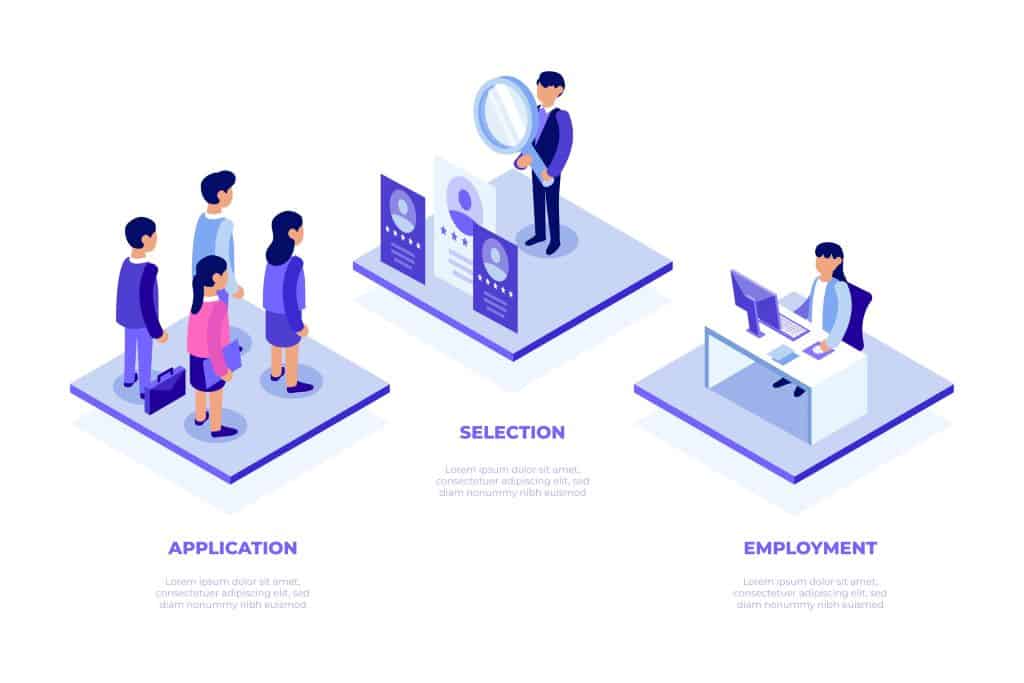Hiring remote employees has become a new trend not just for big MNCs but for budding start-ups also. Many studies and research have also proved that remote working does not affect the productivity of employees but has tended to increase productivity of the employees by providing them the comfort of their homes. It is not just an alternative option anymore, it has become a choice. More and more companies are realizing the benefits of hiring remote employees and are adopting it. However, working remotely can be a little different and tricky than working from the office, moreover, it needs different recruitment strategies to hire remote employees. This blog will help you identify the top 7 common mistakes that you need to avoid while hiring remote employees and get your recruitment strategies correct.
7 Common mistakes to avoid while hiring remote employees
- Setting unclear expectations about the Job
Expectations from remote employees are slightly different from regular office employees. These expectations if not communicated properly and clearly can create confusion between the company and the remote employee. These expectations may include project deadlines, quality expectations, time management, and other important aspects of remote hiring. It is important for any recruiter to be very specific about the company’s policies, procedures, work culture, and other important details and information to avoid any future chaos. This transparency in the recruitment process can prove to be beneficial for the organization.
- Sticking to your own locality for sourcing the candidates|
One mistake that most recruiters make while hiring remote employees is that they avoid searching for potential candidates outside their locality. However, the most useful benefit of remote work is its freedom to surpass the geographical barrier and grab opportunities from anywhere in the world. This also benefits the organizations to expand their search results and have a diverse talent pool.
- Keeping the mentality of good resumes means a good candidate
No doubt that while hiring remote employees, the resume should be the first thing you look at. But it shouldn’t be the sole factor to be taken into account. They may serve as more of a hindrance than an aid. A lot about a candidate’s past activities can be known from their resume. However, this must not become the only base of your choice on how successfully the candidate performed those duties. Don’t judge someone solely based on their resume. A strong résumé alone does not make someone the ideal candidate for the job. Do a proper background verification on the candidate, evaluate his skills, and conduct interviews before making any solid decision. - Not assessing the candidate’s communications and collaboration skills
One of the main skills that you need to consider while hiring remote employees is the candidate’s communication and collaboration skills. These skills can either make or break your remote team. How will a candidate who is not good at communication collaborate and communicate with his team? If the communication and collaboration are not at the point it will affect the team’s productivity and ultimately would cost the organization in many ways. Therefore, try to prefer candidates that are fluent in the preferred language or languages of the business. Take a language test early in the recruitment process to get clarity about the candidate.
Along with this his knowledge of using remote communication tools also plays an important role in the process. While hiring remote employees, these skills become a topmost priority. However, he can be trained but basic knowledge is a must. - Not familiarizing the new hire with the team.
As discussed before, remote teams are all about collaboration and management, so if you don’t familiarize the new hire with the team he is working with, it would get difficult. You need to help the remote employees to adjust and acclimate them to your team for a good collaboration. Just don’t dump all the information at once and then leave him in the wild to figure things out on his own, try to be there for him for starting weeks till he understands the team’s culture and way of working and adjusts himself accordingly. - Not providing proper communication tools
Remote teams need to be connected to each other for daily communications and meetups. Thus, having the right communication tools plays a critical role in the smooth functioning of a remote team. The choice of the tool depends upon the team’s requirements. However, it is important to have a tool with the perfect combination of synchronous like video or audio calls and asynchronous like emails and chat communication channels. - Starting without a proper training process
It is a general practice to have a proper training session whenever a new employee starts off, to let him understand the work culture of the company and understand the processes, tools, and details about the job. But, in the case of remote employees, the training session should also be the lessons about the communication tools that are to be used for further communications. Different companies may use different tools for communication, so it is important to let them understand the tools that your company uses to make the collaboration of the team. The other things in the training session are the same as the regular office training sessions. These training sessions are important for the new hire so that once he starts working on things, everything is just good to go for him and he doesn’t get stuck at things in the middle.
Best Practices to Adopt for remote work
There are certain practices that one can opt for while hiring remote employees to maintain a suitable work environment. These include:
- Mentioning clear guidelines and policies:
It is important to build trust in the process of recruitment, therefore communicating the expectations in the very first round is a healthy practice of trust-building. Tell the candidate what you expect from him, be it a certain number of working hours a day, completing the targets, or working on various tools and projects, everything must be communicated clearly. - Focusing on team-building practices
A remote team exists virtually, so building cooperative, communicative teams that care about one another’s success falls first on the list. This could include social gatherings and retreats where possible, as well as other activities like acknowledging team and individual accomplishments. - Investing in top-notch technologies:
Companies with highly effective remote teams make investments in the tools that enable their employees to fulfill their duties. These include mobile and remote PCs, fast bandwidth, dependable and user-friendly apps, and other business-specific requirements.
To Sum UP:
Remote teams are not difficult to manage or hire, it is just that there are certain things that you need to consider and take into account before hiring remote employees. There are organizations like Bridgentech that can help you build a strong remote team. Contact Bridgentech at info@bridgentech.com








